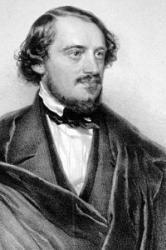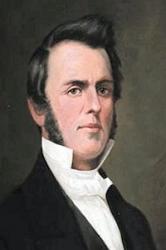1824 - 1881 Person Name: W. Morley Punshon, D.D. Hymnal Number: 253 Author of "Sweet is the sunlight after rain" in Evangel Songs Punshon, William Morley, LL.D. This greatly and justly honoured name of recent Wesleyan Methodism finds a tiny niche in this work from a thin poetic vein, which gave him much enjoyment, if its working out must be confessed to have yielded nothing of permanent value for hymnody, or at all comparable with his splendid service to the Christian Church as preacher and lecturer. His contributions to J. Lyth's Wild Flowers, or, a Selection of Original Poetry (1843), though reprinted in 1846, speedily withered as "flowers" in a hortus siccus. His Lays of Hope (1853) was no advance on the Wild Flowers. His Sabbath Chimes, or, Meditations in Verse for the Sundays of a Year (1867), suggested inevitable comparisons with Keble's classic of the Christian Year. Throughout, the thinking is bewilderingly meagre, the sentiment commonplace, the workmanship clumsy and poor. Ease and inspiration are absent. His Life has been amply and lovingly written by F. W. Macdonald and A. H. Reynar (1887); and it is a noble and beautiful story.
He was born at Doncaster on 29th May, 1824, only child of John Punshon and Elizabeth Morley. The latter was of a good family. He lost his parents in boyhood. Through maternal relationship, young Punshon was introduced to commercial life in Yorkshire, Hull, &c. He marked 29th November, 1838, as the day of his spiritual birth. In 1842 he began to be heard of locally as a preacher, being still in business. In 1844 he proceeded to the Methodist Theological Institute at Richmond; but remained there only a few months. He preferred evangelizing to stated preaching. He leapt into popularity at a bound, probably not to his gain, either intellectually or morally, though his diary breathes an admirable humility. In 1854 he made his advent as a lecturer by his Prophet of Horeb. The impression made by it was amazing. Then followed others, with ever deepening and widening impression. Contemporaneous with his abundant, over-abundant preaching and platform speaking, was such quantity and quality of effective work and service in raising large sums of money for Christian and other missionary and educational work as astounds a reader of his Life. He was five times President of the Canadian Methodist Conference (1868-72), and once of the English Conference (1875). His degree of LL.D. was conferred upon him by the Victoria University, Cobourg, Canada, in 1873. Throughout, in private and public, he was a large-souled, whole-hearted, true man of God. "Weakened by the way" on the continent, he slowly worked his way home, and after a brief final illness, fell gently and softly asleep on April 14, 1881. His hymns in the Wesleyan Hymn Book, 1875, and the Methodist Sunday School Hymn Book, 1879, are :—
1. Listen ! the Master beseecheth. Go, work in the Vineyard.
2. Sweet is the sunlight after rain. Sunday Morning.
3. We woke today with anthems sweet. Sunday Evening.
No. 1 is in the Methodist Sunday School Hymn Book, 1879; and 2 and 3 are from the Sabbath Chime, 1867. [Rev. A. B. Grosart, D.D., LL.D.]
--John Julian, Dictionary of Hymnology (1907)
=========================
Punshon, William Morley. (Doncaster, Yorkshire, May 29, 1824--London, April 14, 1881). Methodist. Except for 6 months at Richmond Theological Institution, he qualified privately for pastorates at Newcastle (1845-1848), Sheffield (1848-1855), Leeds (1855-1858), Bayswater (1858-1861), Islington (1861-1864), and Clifton (1864-1867). His growing fame as preacher, lecturer, and organizer led to his appointment as president of the Canadian Methodist Conference in 1867, to maintain a British tie despite Confederation. Between 1868 and 1873 he travelled all over Canada, besides spearheading the erection of Metropolitan Church. Canadians repaid his leadership and achievements by using for a century three hymns from his Sabbath Chimes (1867). He served as president of the British Methodist Conference (1874-1875), and as Missionary Secretary.
--Hugh D. McKellar, DNAH Archives
William Morley Punshon


 My Starred Hymns
My Starred Hymns




